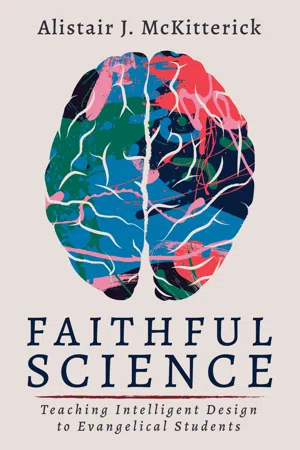![]()
1
Research Question
[The] ability to transform research into action can meet the needs of employers and society, demonstrate improvements in practice and help society adapt well to the ever-increasing pace of change in the twenty-first century.
The research question
The research question for this thesis is “To what extent, if at all, does teaching intelligent design to evangelical students contribute to their confidence and ability to share their faith?” I address this question as a lecturer at Moorlands College in response to a problem encountered by my students of science being used as a reason not to believe, or no longer to believe, in the Gospel. My research is part of a professional doctorate in practical theology “designed to meet the specific needs of a professional group [ . . . ] and which develops the capability of individuals to work within a professional context.” The contribution to knowledge comes from the development of my capacity to respond to this context-specific need.
In seeking to answer the research question, several subsidiary questions arise.
•Why is it an important question for me to address?
•What is intelligent design and how does it relate to Christian understandings of science?
•What methods and methodologies were used?
•What is the good desired for the students?
•What were the knowledge claims made?
•What was the change of practice?
These subsidiary questions are addressed in the subsequent chapters of the thesis.
In this introduction I outline the motivation and rationale for the project. Part of that rationale is an outline of my own context as a tutor and lecturer to evangelical students of applied theology, and my interest in the intelligent design argument. It provides the contextual basis for why this question is important for me to research. The motivation for the study derives from the concerns from students’ ministries (discussed more fully below), and this context locates an area for evaluation: did the students benefit from the changes I made in my practice? The research project was a way of engaging with evangelical Christian students to gain an understanding from them of how a change in my professional practice as a theology lecturer at an evangelical college might address a student concern raised from the context of their ministries. The responses of those I interviewed point towards the research having a broader relevance, and the methods used might therefore be relatable to others as a way of responding to similar concerns. It is recognized that there is no neutral point of observation, and that as a participant in the research project I have inevitably influenced the outcomes.
The thesis was complex and developed my capacity as a researcher in areas outside of my expertise. I benefitted from the input of various seminar discussions on methods and methodologies for guiding me through the process of conceptualizing and articulating the research process. One important learning point was to focus on the right voices. Priority was given to the voices of those participating in the research, and they provided the content upon which to reflect theologically. It was also important to bring my own theological evaluations as an expression of the values of the professional context in which the study was done. In this way the literature that I interact with throughout the thesis can be extended.
The nature of the discussion is academic and transdisciplinary. Consequently, the way in which the research is structured needed to be carefully considered. As Costley says, the “‘turn’ towards practice-based research calls for a new relationship between theory and practice.” The topics to consider, she argues, include “awareness of the research aims,” “an imperative to communicate results of the research to non-academic audiences,” “transdiciplinarity,” “criticality,” an awareness of the position of the researcher, and the “ethics, values, trust and power” associated with the researcher, the organization and participants in the research.
Action research and the research question
The research question (“To what extent, if at all, does teaching intelligent design to evangelical students contribute to their confidence and ability to share their faith?”) developed over time. The start of the process was instinctive and unrefined. As Dick argues, this is quite common: “[a]n action research study can begin with quite imprecise research questions.” McNiff considers that it need not even begin with a hypothesis, but just an “idea.” “The research process is the developmental process of following through the idea, seeing how it goes, and continually checking whether it is in line with what you wish to happen.”
McNiff and Whitehead argue that, fo...
